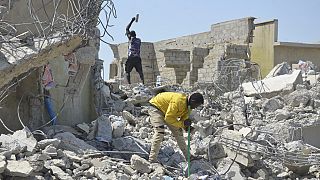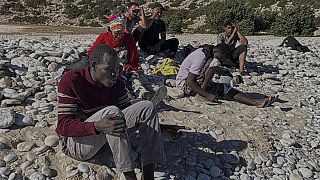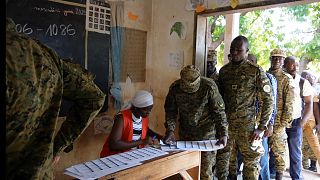Libya
A year after extremely heavy rain caused two dams to burst upstream from the eastern coastal city of Derna, its residents have long given up on finding the remains of their families in the debris.
Now, they are trying to rebuild despite the fact that they will never bury their loved ones.
Thousands of people were washed away and drowned, and tens of thousands more were displaced.
On the night of September 10 last year, residents woke up to the loud explosions of the two dams breaking.
The collapse released so much water it reached two stories high, entirely wiping out neighborhoods, including roads, bridges, and residential buildings across the port city.
Mohsen al-Sheikh, a 52-year-old actor and theater administrator, lost 103 members of his immediate and extended family in the floods.
Now there are only a few surviving members.
His nephew lost his wife and all his children in a matter of minutes. And many of the bodies were never recovered.
More than 11,000 people were killed and 10,000 others went missing, Libya’s Red Crescent said at the time.
The U.N. Office for the Coordination of Humanitarian Affairs said last year that 4,000 people were killed and 9,000 went missing. Another 30,000 were displaced.
Houses in the neighborhood of al-Maghar, where al-Sheikh lives, are built on the hillside of a dry riverbed valley, which became the conduit for all of the deadly water.
The slope meant that many of the buildings had a lower and upper entrance, on either side. Some fleeing families used the back doors to escape to higher ground.
Shaker al-Hosany left his own home to help a neighbor, only to return and find it full of water. His family were able to flee to higher floors.
Derna, a diverse city that houses citizens of Turkish, Andalusian, and Cretan origins, was for years the cultural hub of the North African country.
But it was also a city already deeply affected by the country’s war and more than a decade of unrest and division.
For several years after the country’s uprising in 2011, it fell under the influence of the Islamic State and other extremists.
But it was Storm Daniel that brought the most widespread destruction to the city.
A report published not long after the disaster found that the torrential rains were 50 times more likely to occur and 50% more intense because of human-caused climate change.
The analysis was conducted by the World Weather Attribution group, which aims to quickly evaluate the possible role of climate change in extreme weather events.
Now, one of the country’s rival authorities is putting serious resources into rebuilding.
Derna, in the country’s east, falls under the territory of forces loyal to strongman Khalifa Hifter and his forces in Benghazi.
The country’s west is governed by a presidential council headed by Prime Minister Abdul Hamid Dbeibah.
Across the widened riverbed, al-Sahaba Bridge is being rebuilt along with al-Sahaba Mosque next door.
And there are plans to build 800 apartments for those who lost their homes.
But international observers have warned that the country needs much more support to help the coastal city get back on its feet.











Go to video
Greece cracks down on irregular migration, says it’s "not an open corridor to Europe"
01:11
Mourning begins in Texas as over 170 remain missing from flash floods
00:56
South Africa: At least 101 dead in Eastern Cape floods as rescue efforts continue
01:50
UN urges renewed political and climate action in Libya amid humanitarian and governance crises
00:41
Devastating floods in Eastern Cape Leave 78 dead as rescue efforts continue
01:13
Deadly Floods Devastate South Africa’s Eastern Cape: At Least 49 Dead, More Missing